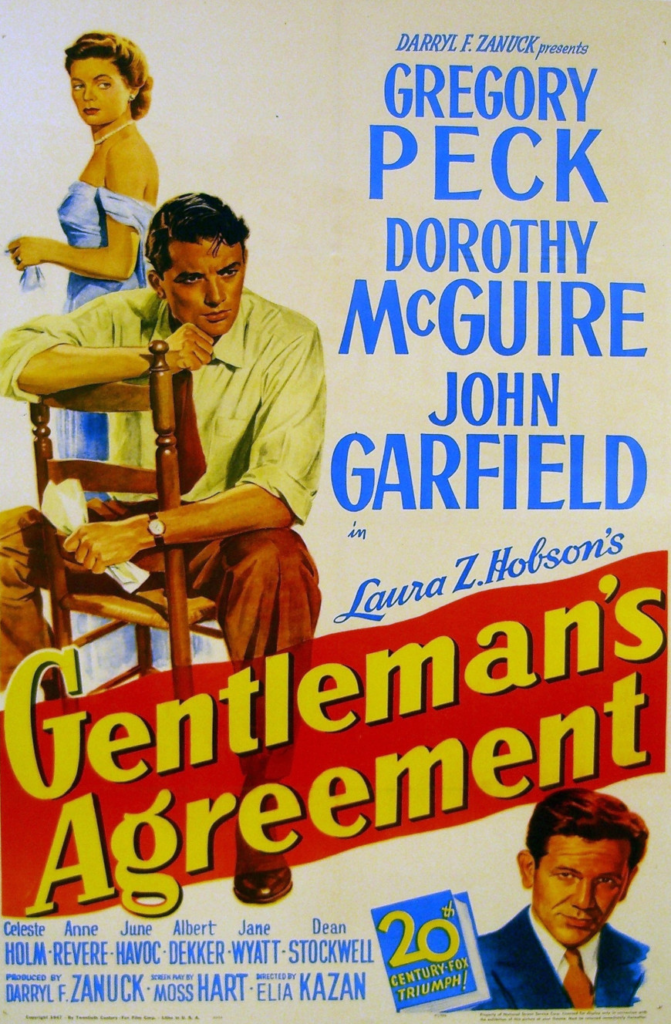
GENTLEMAN’S AGREEMENT (director: Elia Kazan; screenwriters: Moss Hart/from the book by Laura Z. Hobson; cinematographer: Arthur C. Miller; editor: Harmon Jones; music: Alfred Newman; cast: Gregory Peck (Phil Green), Dorothy McGuire (Kathy Lacey), John Garfield (Dave Goldman), Celeste Holm (Anne Dettrey), Anne Revere (Mrs. Green), June Havoc (Miss Wales), Albert Dekker (John Minify), Jane Wyatt (Jane Lacey), Dean Stockwell (Tommy Green); Runtime: 118; MPAA Rating: NR; producer: Darryl F. Zanuck; 20th Century Fox; 1947)
“The film does try to tackle a subject matter that has not been covered too well by Hollywood at the time, and for that alone it should be commended.”
Reviewed by Dennis Schwartz
A worthy film that wears its heart too openly on its sleeve without digging deeper into the anti-Semitic problem. It’s about a respected gentile journalist (Gregory Peck) hired by a magazine publisher (Albert Dekker) to do a hard-hitting expose about anti-Semitism. To overcome his writer’s block, he decides to pass himself off as Jewish–hoping to get something new to say about the subject from first-hand experience. Elia Kazan (“A Tree Grows in Brooklyn”) directs (he won an Oscar for Best Director), Moss Hart does the screenplay that is adapted from a best-selling book by Laura Z. Hobson. It won the Academy Award for Best Picture and is certainly well-acted by this outstanding ensemble cast, but it’s only mildly on target and suffers from sentimentality and being murky. Though showing where its sentiments lie, the film took easy stabs at obvious bias situations and failed to offer any analysis of the deeper rooted problems, thereby for the most part letting the bigots too easily off the hook.
Jewish bigotry at the time was a taboo subject for films. But after WW11 when the horrors of the Holocaust became known world-wide it seemed to non-Jew Darryl F. Zanuck that it was the right time to bring up the subject of Jewish discrimination in America, even though every other Hollywood studio had passed on it as too controversial. It might be difficult today to explain why the film was so daring back then, but it was because that sort of prejudice was kept under the radar and film executives, many of whom were Jewish, were nervous how such a film would play to the public. Even the stars were taking somewhat of a career gamble, that thankfully worked out well. Looking at it today the film hardly seems risky and the courageous breakthrough indictment of anti-Semitism it was–which makes it difficult to fully appreciate its power when it was first released.
The title refers to the unspoken agreement among gentiles to discriminate against Jews; especially, in housing, the job market, and various other places in society where they held power.
The recently widowed Peck has just relocated to New York City with his 11-year-old son (Dean Stockwell), and takes a different first name going from Schuyler to Phil Green. The stranger introduces himself around town as a writer and a Jew. In school his son is bullied in the schoolyard just because he’s Jewish and Peck’s new swell society sweetie, the niece of his publisher, Dorothy McGuire, who’s aware of his secret, is getting some flack from her snide Darien, Connecticut, society chums. The abuses pile up as Peck discovers bias is alive and well, from hotel rejections to being the object of scorn. Peck gets words of wisdom from a real Jew, excellently played by John Garfield, who might be the only Jew cast in the film. He’s around to give the film a voice of authority, making sure it is sincere. In any case, the film does try to tackle a subject matter that has not been covered too well by Hollywood at the time, and for that alone it should be commended as it speaks in a high-minded tone for religious tolerance.
REVIEWED ON 1/23/2004 GRADE: B-